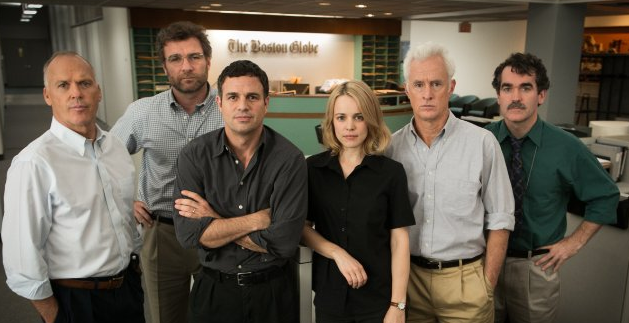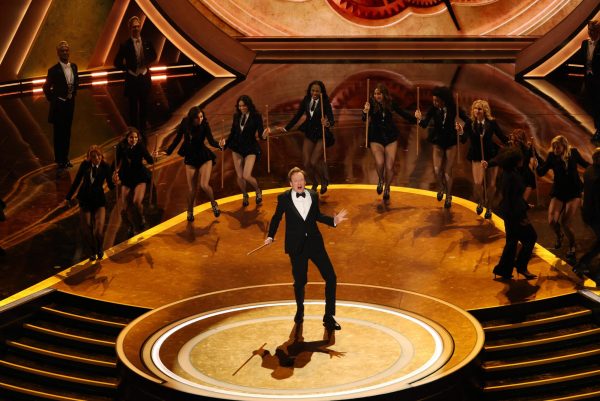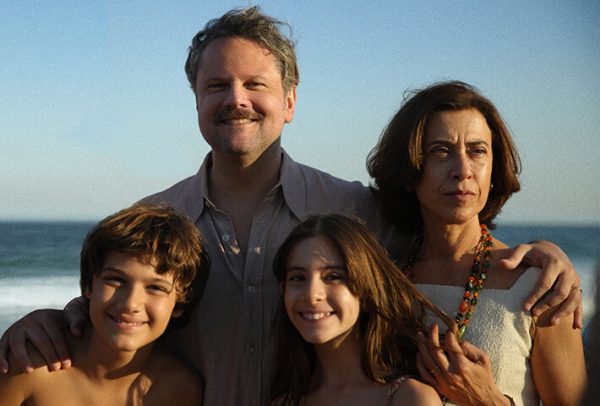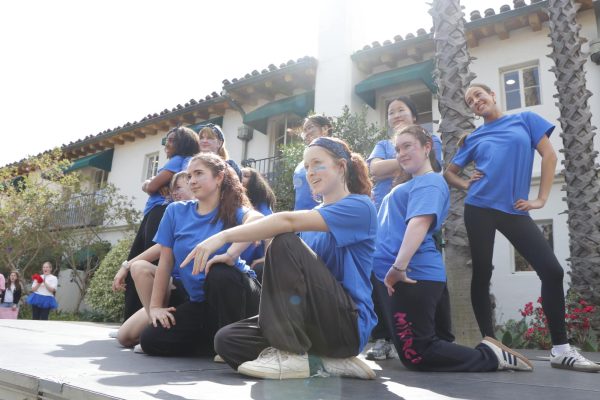‘Spotlight’ is a must-see
The cast of “Spotlight” stands together in the promotional picture of the film. The picture is created by Open Road Films.
When newspapers were delivered to front porches and newsstands in early 2002, the cover page rocked the Boston community, as well as many other places around the world.
The “Spotlight” team at The Boston Globe published a shocking story about the cover-up of the sexual abuse in the Boston archdiocese for decades after an extended period of dedicated reporting. The team sued the Catholic Church, asked difficult questions, helped victims share their stories and chased after legal documents that were being withheld from public records.
About a year prior to the story’s release, Marty Baron, the then newly appointed editor of The Boston Globe, assigned a team of investigative journalists to unearth the massive scandal. Based on a series of true events, “Spotlight” tells the story of the determined members of the team that worked tirelessly in their search for the truth. The film stars Mark Ruffalo, Michael Keaton, John Slattery, Rachel McAdams, Brian d’Arcy James, Stanley Tucci and Liev Schreiber.
“Spotlight” perfectly portrays the determination of investigative journalists without over-exaggerating. Ruffalo brilliantly portrays journalist Michael Rezendes and ultimately steals the show. McAdams, Keaton, Slattery, James and Schreiber also excellently portray the other members of the “Spotlight” team.
This esteemed group was awarded a Pulitzer Prize for Public Service in 2003 for their outstanding contribution to investigative journalism.
Although he is not a member of the “Spotlight” team, Tucci is absolutely phenomenal in his role of Mitchell Garabedian, a lawyer who fought to bring justice to the abuse victims. In one scene, he even says grimly, “This city. These people. Making us feel we don’t belong. But they’re no better than us. Look at how they treat their children.”
“Spotlight” comments on how those who were not members of the Irish or Italian Catholic communities were sidelined and discredited by the Church.
After all of the journalists’ hard work, the film interestingly chooses not to show the triumph and success of the journalists’ excellent reporting. In fact, the final scene of “Spotlight” shows the journalists scrambling in their cramped offices to answer the phone, which rings off the hook because an unprecedented number of survivors wanted to come forward and tell their stories.
The endless phone calls reveal that the severity and magnitude of the issue is even more significant than anyone could have ever imagined. The problem did not solely affect Boston but countless other places around the world including Italy, Argentina, Tanzania, Canada, Brazil, Australia, Sweden and many other cities across the United States.
Before the release of the story, the victims and their families felt petrified to come forward because they were convinced the right thing to do was to blame themselves, rather than acknowledge they had been abused by someone else.
When speaking about his experience with priestly abuse, one victim, said “It’s like God asking for help. How do you say no to God?”
Additionally, “Spotlight” masterfully displays the cynical fact that the reporters themselves somewhat contributed to the ways of the Catholic Church. Pfeiffer attends church with her deeply religious grandmother. Walter “Robby” Robinson, portrayed by Keaton, acknowledges that through his close relationships with prominent lawyers in Boston, he had already known about the sexual abuse for a long time.
Getting rid of the corrupt priests, archbishops and other members of the Catholic Church is one thing. Changing the culture of one of the largest, most influential institutions in the world is another. “Spotlight” is an incredibly powerful movie that will continue to move audiences around the world.
-
Story
-
Acting
-
Technical Quality
-
Enjoyment
-
Impact

Alexandra Chang joined The Oracle as a contributing writer in 2014 and became the Culture Editor in 2016. She was then promoted to Managing Editor as a...










Sarah Wagner • Dec 1, 2015 at 11:31 am
Great movie! Some of us journalism students went as a group to see it, and we were so impressed with the way it showed the real grueling work of true journalism. Great article!!
Sara Fredrickson • Nov 24, 2015 at 10:59 am
I’m very much looking forward to seeing this movie, and before I do, I appreciate knowing a little more background to the story. Thanks for the thorough and well written review!